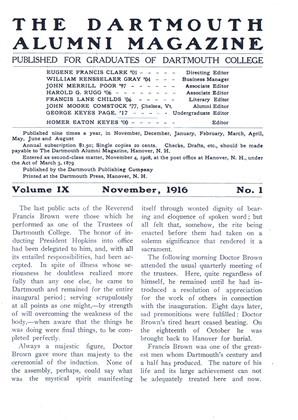A proper understanding of the needful limits upon the theory of individualism is important in defining the relations between the college and the undergraduate body. In a large way the college exists for the individual student; but it does not exist so truly for the individual' student as for the generation of college men, and it does not exist for either as definitely as for the social group which is the state. It is an easy and a pleasant thing to say to an undergraduate member of the college what properly interpreted is true,—that the institution is established and maintained for his benefit. If, however, application of this statement is interpreted to mean that the college lives to meet his personal convenience or to enhance his personal success, as apart from the needs of society and his ability to contribute to them, wrong is done the man, and the college trust has been maladministered. ...
The service which the college should render to the nation includes, very definitely the inculcation of an idea of the value of discipline m the minds of those men who have conferred upon them the advantage of the college ments \nd this cannot well be instilled if the college abjures all responsibility for maintaining a code of discipline. This is one of the vital reasons for the existence of certain standards of intellectual competency and moral:inclination for membership in the college. Admittedly, many of these are awkward and some may be badly designed for the purpose sought; but even so, they should stand until they can be replaced with methods better devised This is the answer that must be made not infrequently to some earnest and loyal friends of the college, who, from the best of intentions, seek to neutralize its standard;, bv reiterated requests that exception be made to regulations of proved wort , •md who are prone to contend that all human attributes have disappeared from college teaching and college administration because the avenues to special privilege have been closed. The same reason exists for saying to the undergraduate that his preferences, either concerning modifications of the curriculum or in regard to administrative policy, cannot necessarily prevail unless, in the opinion of the best intelligence derived from experience, such modifications are for the ultimate accomplishment of those ends for which the college exists as a Thus in the not infrequent student query as to what benefit he derives from certain curriculum requirements of non-utility, the attempt should be made to have him understand that the cultural heritage handed down through the ages, and now particularly entrusted to the historic college, is worthy of preservation. But the requirements cannot be abolished even if he remains unconvinced, for the college is more responsible for his ultimate satisfaction than for his imdiate contentment.
I recentiy chanced upon a quotation from the London Journal of Education on the relation of education and character, which clearly expresses the thought that is becoming more largely held in regard to our colleges particularly, as well as in regard to education at large:
To turn out boys with pleasant manners, generous hearts and good animal spirits is not enough; we want boys and girls with trained intelligence, who have been made to use their brains and taught that not 10 use them is a sin. * * * Every boy and girl who grows up mindless, ignorant or intellectually undisciplined, is so much dead weight hanging around the neck of the community, and ought to be made to feel it. When we discuss character and education, therefore, let us give the fullest possible meaning o each word."
I believe that it is worthy of more emphasis than has sometimes been given that the development of character is distinctly one of the great responsibilities of the college. The introduction of university methods into college teaching the influence of professionalized scholarship in the chairs of instruction, and the marked disinclination of men of the present generation to consult together concerning the deeper phases of life have, all together, so altered the once existing relationship between teacher and student that the old-time formative influence of the college faculty on student character has too greatly disappeared. It is still, however, not to be forgotten that our colleges were founded and sustained through years of drastic toil by men of religious fervor who in self-sacrifice, literally gave their lives for the perpetuation of institutions designed no less for spiritual inspiration than for intellectual command, Forms of expression change from generation to generation, and manifestations of spiritual instinct differ widely from those of a century-and-a-half ago. But the initial obligation rests upon us to make the college influential in the development of those traits vital to well-proportioned goodness.
Scholarship as a product of the college is incomplete except as it be established on 'the foundation of character which is not only passively good, but which is of moral fibre definite enough to influence those with whom it is brought into contact. By as much as evil directed by intelligence is more dangerous than brainless badness, by so much is the college open to the danger of doing the country an ill turn if it ignores its responsibility to safeguard and develop character as it undertakes to stimulate mentality.
 View Full Issue
View Full Issue
More From This Issue
-
 Article
ArticleThe last public acts of the Reverend Francis Brown
November 1916 -
 Class Notes
Class NotesCLASS OF 1912
November 1916 By Conrad E. Snow -
 Class Notes
Class NotesCLASS OF 1912
November 1916 By Conrad E. Snow -
 Class Notes
Class NotesCLASS OF 1912
November 1916 By Conrad E. Snow -
 Class Notes
Class NotesCLASS OF 1910
November 1916 By Sturgis Pishon -
 Class Notes
Class NotesCLASS OF 1910
November 1916 By Sturgis Pishon









